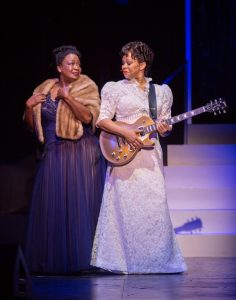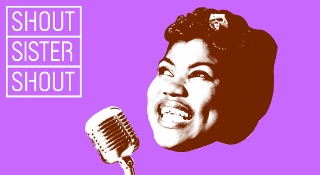THE ORIGINAL SISTER ACT
This new bio-musical of the legendary gospel/rock crossover star Sister Rosetta Tharpe is at its best when focusing on its three powerhouse female stars. Tracy Nicole Chapman as Tharpe, and Yvette Cason and Angela Teek Hitchman, both in multiple roles, are veteran performers with awe-inspiring voices that take a song and milk every ounce of humanity, pathos, joy, and musicianship from it. The three of them have a great sequence where Tharpe indulges in some playful rivalry with Cason, playing an unexpectedly droll Mahalia Jackson, while Hitchman is the relatively girlish Marie Knight, a pianist that Tharpe steals from Jackson.
 Tharpe and Knight spend five years together in a musical and romantic partnership that Tharpe counts as the happiest time of her life. Chapman and Hitchman give these scenes humor and depth. You root for this relationship to last. That it doesn’t gets to the heart of Tharpe’s struggle to find a place for herself as she navigates between gospel, rock, and blues; and Christian and secular realities. Also powerful is the connection between Chapman and Cason as Tharpe’s mother, Katie Bell. Cason grounds the mother-daughter relationship in unconditional love and support. She’s a Christian woman with true faith, but she’s also a pioneer in her own right, who raises her daughter in a traveling ministry that brings them a “dollar for every holler,” allowing them an unusual level of self-sufficiency and autonomy. And she’s got a sense of humor. Asked why she left her husband, she quips, “I didn’t leave him. He just didn’t want to come along.” Tharpe loses the freedom afforded by her mother when she marries for the first time.
Tharpe and Knight spend five years together in a musical and romantic partnership that Tharpe counts as the happiest time of her life. Chapman and Hitchman give these scenes humor and depth. You root for this relationship to last. That it doesn’t gets to the heart of Tharpe’s struggle to find a place for herself as she navigates between gospel, rock, and blues; and Christian and secular realities. Also powerful is the connection between Chapman and Cason as Tharpe’s mother, Katie Bell. Cason grounds the mother-daughter relationship in unconditional love and support. She’s a Christian woman with true faith, but she’s also a pioneer in her own right, who raises her daughter in a traveling ministry that brings them a “dollar for every holler,” allowing them an unusual level of self-sufficiency and autonomy. And she’s got a sense of humor. Asked why she left her husband, she quips, “I didn’t leave him. He just didn’t want to come along.” Tharpe loses the freedom afforded by her mother when she marries for the first time.
 The marriage to the Reverend Tharpe is unhappy. She chafes under his patriarchal control and ends up leaving him to go sing at the Cotton Club, a revelatory event in her life, where she is introduced to the pleasures and pitfalls of the world outside the confines of her religious community. Michael A. Shepperd is physically and vocally commanding as the reverend. He is charming enough to make us believe she would marry him, yet bombastic enough that we also believe she won’t miss him all that much when she finally gives up.
The marriage to the Reverend Tharpe is unhappy. She chafes under his patriarchal control and ends up leaving him to go sing at the Cotton Club, a revelatory event in her life, where she is introduced to the pleasures and pitfalls of the world outside the confines of her religious community. Michael A. Shepperd is physically and vocally commanding as the reverend. He is charming enough to make us believe she would marry him, yet bombastic enough that we also believe she won’t miss him all that much when she finally gives up.
The rest of the ensemble does an excellent job of bringing varied characters to life throughout. Boise Holmes has a great turn as a street musician who unwittingly provides the catalyst for Tharpe’s rock and secular crossover. Thomas Hobson has the unenviable task of playing Little Richard and he struggles to find an effective vocal and physical style. There isn’t a lot of dance, mostly staged movement, so choreographer Keith Young has little chance to shine as brightly as he did recently with Five Guys Named Moe at Ebony Rep. Music director and arranger Rahn Coleman emerges as a star in his own right, subtly updating and expanding the sound and balance of the Tharpe repertoire. The music rolls across the audience in waves of pure pleasure.
Creator/director Randy Johnson and creator/book writer Cheryl L. West have assembled an incredibly satisfying evening of music. In addition to the dramatic sequences between the female characters, West creates some smart and quirky moments, particularly a very funny scene of Tharpe practicing “proper” enunciation by listening to the radio and repeating what she hears. Her treatment of Tharpe’s foray into lesbianism is also quite funny, but touching and sexy too. Johnson stages effective tableaux on the bare-bones set by Steven C. Kemp. But the plot device that holds it all together threatens to sink the ship: The show opens with Tharpe about to enter heaven, when God gives her a last task. A young musician back on Earth is about to take his life. By taking him on a journey through her own life, Tharpe is meant to show him the value of his own life. It’s a theatrical chestnut that diminishes rather than illuminates.
 Logan Charles plays Isaiah, a young musician on the verge of suicide. He sings well, but it’s an impossible role, requiring him to stand on stage doing nothing endlessly, watching Tharpe, with only occasional interaction. He talks about his dead mom and his many unspecified failures, but we never get a chance to truly know him or feel anything other than disinterested concern. Chapman and Charles have nothing to hold onto. Most of their dialogue is bickering and self-help aphorisms.
Logan Charles plays Isaiah, a young musician on the verge of suicide. He sings well, but it’s an impossible role, requiring him to stand on stage doing nothing endlessly, watching Tharpe, with only occasional interaction. He talks about his dead mom and his many unspecified failures, but we never get a chance to truly know him or feel anything other than disinterested concern. Chapman and Charles have nothing to hold onto. Most of their dialogue is bickering and self-help aphorisms.
The fact is, we don’t care about the kid. His dilemma is utterly superfluous to the tale of this great star’s life. And finally, it feels wrong that her final achievement in the story should involve not her own music, not her own loves and losses, but a stranger with no claim on our emotions. His unfinished attempts to play a song for her, to reveal himself fully, are meant to take us to a catharsis when he finally gets there. Yet the song isn’t particularly memorable. We long for Chapman to come back and bring us to our feet again with “Jericho.”
Sister Rosetta Tharpe was, of course, not just a singer. She was a legendary guitar player who created riffs and stage moves that were picked up by artists as diverse as Chuck Berry, Elvis, Johnny Cash, and Little Richard. The creators of Shout Sister Shout! must find a better option than asking Chapman to pantomime. Pretending to strum a guitar all night makes the willful suspension of disbelief more difficult that it should be.
photos by Jim Cox Photography
Shout Sister Shout!
Pasadena Playhouse
39 S. El Molino Avenue in Pasadena
Tues-Friday at 8; Sat at 4 & 8; Sun at 2 & 7
ends on August 20, 2017
for tickets, call 626-356-7529 or visit Pasadena Playhouse




